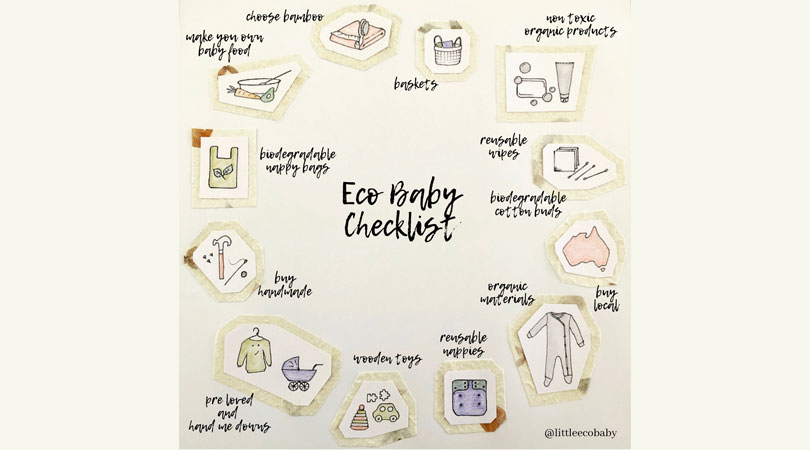
28 Jun Sustainable Switches For A New Parent – An Eco Baby Checklist
Becoming a parent can be daunting. And if it’s not daunting, there’s still a lot of stuff you have to consider. When you find yourself going through your checklist of “must dos” and “must haves” in preparation for a baby, most of us just take the lead from our family and friends. What did they use? What did they do? (I love that we can support each other but I actually think this is where a problem begins.) What “they” did is often not actioned with sustainability in mind. So, if you’re green minded let me give you, mother to mother, friend to friend, your own eco checklist.
- Reusable nappies are more environmentally friendly. They prevent millions of disposable nappies ending up in landfill every day. Using reusable nappies prevents the manufacture of disposables, which uses finite resources and contributes to global warming. There is an environmental impact of cloth nappies and it’s mostly a result of the energy used to wash and dry them (this is nearly obsolete when you use 100% solar power as we do), but overall they are a much more environmentally friendly option. And an added bonus is that using cloth nappies gives you control over the chemicals that come in contact with your child’s skin.
- Reusable Wipes are more cost-effective, more efficient, create less waste in landfill, and help you avoid the use of irritating soaps and chemicals on your baby’s delicate bottom.
- Buy pre loved baby accessories like a bassinet, cot, high chair, car seat and pram. Often these items have hardly been used or in really good order. Using pre loved means you are keeping all those new purchases out of landfill!
- Non toxic skincare will protect your children from harmful toxins. Babies are more susceptible to the effects of chemicals due to their rapidly developing organ systems and developing epidermal barrier so it’s crucial to use non toxic (preferably certified organic) products to ensure they are healthy.
- Use bamboo swaddles, blankets and clothes. Bamboo is extremely environmentally friendly, using very little water to grow, needing no harmful pesticides and being 100% biodegradable. It’s also naturally hypoallergenic and antibacterial, an excellent choice for the sensitive skin of your baby. Bamboo fabric also acts as a thermal regulator, helping your baby to stay warm when it’s cool and cool when it’s hot.
- Biodegradable cotton buds usually made from bamboo, reduce the amount of plastic ending up in our oceans, on our beaches or in landfill.
- Organic baby clothes will cut your baby’s exposure to toxins. Due to the absence of toxic chemicals such as herbicides, insecticides and pesticides, organic plants can grow naturally while keeping all the nutrients intact. Organic clothes will help to avoid skin allergies making your baby happy and comfortable.
- Make your own baby food, and if you do buy pre made, choose something that comes in glass rather than the single use soft plastic pouches.
- Wooden toys are not only cute they are much more environmentally friendly. Ditch plastic toys because as an organic, renewable substance, wooden toys are biodegradable, sturdy and can be recycled.
- Utilise hand me downs from friends and family. I have literally been able to dress my son in nearly all pre loved clothes! My friends and I love to see our baby’s clothes loved again, there’s are real sense of sentimentality and community when you see the clothes you once adored on your own baby on a younger bub of one of your friends.
- Buy handmade, it’s more sustainable than mass produced items. They don’t require a large production facility because most items are made in small studios. Handmade items are usually made to withstand the test of time and can be used for multiple children through the generations. You can make a stand against this throw away and replace culture.
- Baskets made from natural fibres are fantastic for storing toys and baby goods. They are a much better option than the usual plastic options because they look better, will usually last longer and will ultimately break down in landfill.
- Buy local! Supporting local small business reduces waste from packaging and also reduces the use of fossil fuels in transportation. Keeping your money local further strengthens the economic base of the whole community.
- Eco Disposables use less chemicals and generally contain less dyes and gels than mainstream disposables. They still take some decades to break down in landfill, so they aren’t perfect but are a much better option than mainstream disposables.
- Biodegradable nappy bags are really handy if you’re collecting the biodegradable bamboo liners off cloth nappies to add to your general waste. Also, if you’re using disposables and want to wrap your dirty nappies in a bag, 100% biodegradable and compostable nappy bags are a much better option than regular plastic nappy bags. Biodegradable bags will break down quickly instead of leaching in landfill.
So relax knowing if you tick off this checklist, you’ll be making some real positive environmental steps! A parent taking these actions today will be the example to their children and help them form positive habits and behaviours to protect their future.
Stacey Ring is a mother of two and co-creator of Little Eco Baby Nappy Service. She is passionate about sustainable living and helping parents to incorporate modern cloth nappies into their lives.
littleecobaby.com.au
About the Author
Stacey Ring is the co-founder of Little Eco Baby Nappy Service. Little Eco Baby is a safe, sustainable, no fuss nappy service that is affordable for time poor parents.
Stacey is passionate about sustainability, natural health and wellbeing and is motivated by helping parents make more positive choices for their babies’ future.
Website: http://www.littleecobaby.com.au
Facebook: http://facebook.com/littleecobaby
Instagram: http://instagram.com/littleecobaby


